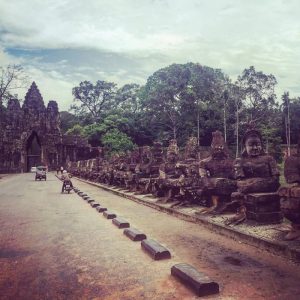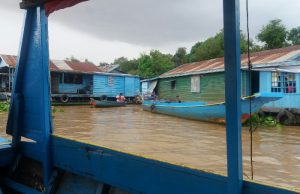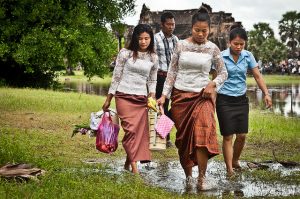I saw a dog get run over in Cambodia.
In the back of a tuk tuk (think “motorcycle rickshaw”), my husband worried aloud that he could see a little black puppy trying to cross the busy street up ahead. Turning over my shoulder from the seat facing him, I saw what looked like a labrador-type puppy trying to dodge between cars, trucks, and tuk tuks to get to the other side of the road.
“Oh please let him be ok, please let him be ok…” I said softly to myself, the universe, and everybody.
Thinking, “Of course he’ll make it across safely, because as terrifying as it is, dogs always do,” I turned back to my husband and friend and continued our chat about our next tourist destination. In my world, the cars always stop, the dog always makes it.
Then it happened. Blindingly fast, and torturously slow.
I heard his scream before I knew what happened. It is a cruel reflex that when humans hear a loud, surprising noise, they cannot help but turn toward it. I looked to my right just in time to see that small, black puppy’s back being crushed beneath the wheel of a truck. I couldn’t tell which screams were his and which were mine.
A crowd of local Siem Reap residents paused to see what had caused the screams, some made steps toward the puppy, but it was evident that the flow of foot and car traffic was just looking for a way to move on. I wailed and covered my face willing the image of the screaming puppy to be scrubbed from my memory; I reflexively prayed that the puppy would die quickly and as painlessly as possible. It was a knee-jerk reaction I did not expect.
As traffic cleared and our tuk tuk was able to pick up speed again, I opened my eyes and gazed down the road just in time to see the desperate, broken puppy alive and still trying to drag itself the rest of the way across the road. Traffic was flowing again, tuk tuks were veering around the dog, people’s heads were turned to him, but everyone kept moving.
Life in Siem Reap continued.

A few minutes later, our smiling tuk tuk driver pulled over at a historical point of interest. Grinning, but obviously unnerved by the sobbing American woman in his vehicle, he said to me matter-of-factly, but not unkindly, “The dog should not have been in traffic. He got too close to the cars. These things happen. There was nothing we could do.”
“I know, I’m sorry, I’m sorry, I know,” I sputtered trying to stop shaking. “I’m just not used to seeing such things, I’ll be fine, I just love dogs, I’ll be fine…”
“You’ll be ok!” Our driver said patting my shoulder. “Each statue on this bridge represents a god in…”
We got out of the tuk tuk and I pretended to hear what he was telling us about the magnificent stone bridge. I pretended to care about this relic of Cambodia’s past. But in the moment, all I could think about was that dog. Over and over the scene replayed before my eyes, my ears filled with the puppy’s screams.
And while I gave myself permission to swim in my grief for a bit, I was also acutely aware of my own privilege. What must our tuk tuk driver think of me? The American woman who can look unblinkingly at throngs of doe-eyed-but-savvy children asking for money, but comes thoroughly undone when yet another random dog gets run over by a car?
In a city where poverty and desperation do not always politely keep themselves out of sight, where the average Siem Reap resident lives on the equivalent of only a few US dollars a day, where Khmer Rouge literally starved a population to death, I had the audacity to weep for a dog?
I cannot apologize for who I am. I cannot apologize for the lottery I won being born in a first world country. I will not apologize for the intense feelings I have about the humane treatment of animals. But in the minutes following the black puppy’s accident, it became crystal clear that because of my privilege the death of a dog, an animal, is the most immediate dread in my life. Such fears are luxuries for post-Khmer Rouge Siem Reap.
Please don’t misunderstand. Siem Reap does not need my pity, nor my guilt. Contending with my privilege is a privileged thought in and of itself. And really, where does it lead? However, I do think that examining my role as a tourist in the ecosystem of the city is not only worth considering, but should be considered by more tourists – specifically western tourists.
As we darted from temple to ancient temple snapping dazzling photos, buying trinkets and snacks, posing for the occasional selfie, I began to notice something troubling in how we moved through the city and countryside: It was so easy for us.

Everywhere was English, everyone was ready at a glance to help us, practically imploring us to let them help us. Everything was geared toward the comforts of a westerner. This is understandable, as the majority of Siem Reap’s economy comes from tourism with almost 100% of that tourism coming from foreign countries. Most of those countries are either western, westernized, or operate heavily under “western culture as normal culture” ideals.
My husband, my friend, and I were the foreigners, but instead of having to figure out a few words in Khmer, most of the locals we encountered either spoke English or apologized to us for their poor English.
Everywhere we turned Siem Reap was bending to western culture in an attempt to thrive, as a means to preserve its culture through our dollars. But at what point does a culture start to disappear under the pressure of western dominance? I wonder if the throngs of tourists and their demand for Westernism are slowly eating away at a culture that is working to reassert its identity?
Is my spending a dollar there, a couple dollars here, relatively thoughtless spending for an American, contributing to a greater disparity between the social classes in Siem Reap? Those who can purchase and maintain a tuk tuk, learn English, present themselves “appealingly” to skittish tourists get a leg-up, whereas those who cannot participate in tourist culture due to disability, familial or financial constraints must struggle.
Our tuk tuk driver, he called himself “Mak”, took us to a large village restaurant that would have been outdoors if it had not been for the patchwork of tarps serving as a roof. He panicked when a little girl, no more than three, squatted about 10 feet from our table and relieved herself in the dirt road between the restaurant and a neighboring structure.
Shouting to the restaurant owner in Khmer, a group of women surrounded the bewildered child and, scolding her, pushed her on her way. Turning to us, he apologized profusely. “You are not used to seeing that,” he said sheepishly.
We were three westerners in their village, admittedly brought there to spend money, but the sense of panic over that little girl — and what we might do over the very “non-western” behavior of the girl – was palpable.

Sitting with us at our table, Mak told us about his family. His mother had passed away in the years following Khmer Rouge rule, his father had been sick and bedridden for the past decade. Mak supported his father, cared for him, and made sure his brother got an education.
“My brother, he is younger than me, but he is so smart. His is English is so good, not like mine. People think he is me, we look alike, but he speaks better, he goes to an English school. I am lucky, I drive the tuk tuk so he can finish school, maybe go to university, get a good job. I could not finish school. But I taught myself ok enough English to drive Americans, English, Canadian tourists. But I will make sure my brother finishes. I have to stay here and work for him, for my father. But he is better.”
I got a real sense of pride from Mak that his brother spoke English, that he himself spoke enough English that he could drive tourists around. Though I couldn’t help but wonder if the ability to speak English was a “make-or-break” skill in Siem Reap? And more than that, I wondered how much of the culture was being subdued and manicured to cater to western ideas of Orientalism and comfort?
But one can’t move through a place like Siem Reap paralyzed by questions of privilege and responsibility. It is of no use to the locals and it becomes navel-gazing, narcissistic. During my first foray into a third world country, I found myself trying to balance between taking in what I experienced at face value — easy kindness, eager hospitality — and willing myself to see beyond the curtain of propriety to the very human need that wove it.
In unraveling how my privilege as a westerner impacts Siem Reap, I wonder if the only unfettered moment during my time in Cambodia was when the little, black dog was crushed? It was the only time I was asked to put aside my American “feelings” and sensibilities, and remember that “these things happen” everyday in Siem Reap. It is how life is.
But that life is changing. In many ways for the better, economically, socially; but is there a cost? Is western influence fortifying Cambodia, or systematically deconstructing it to to be remade in the west’s vision of “Cambodia”?
I don’t know how to answer these questions, but for the first time in my life, I came face to face with these questions of cultural responsibility.
Big questions of humanity, that all started with a little, black dog.
Photo: Carlos Felipe Pardo/Creative Commons


What a powerful thoughtful piece of writing this is. I would have reacted exactly as you did except it would have been difficult for me to put it into context as you have. The fact that you’re asking yourself these questions means that little dog didn’t die in vain.